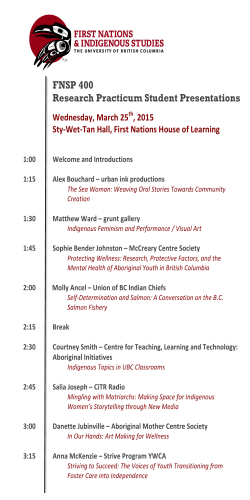
Research Poster Presentations
Indigenous Research Symposium The Knowledge within: Sharing Indigenous Research and Story Poster Session Sat. March 21st, UCC Atrium, 9AM – 3PM Michelle L. Froman, MA Candidate, Faculty of Educa9on Aboriginal / Indigenous Women’s Graduate Student Experiences in Ontario The focus of this proposed research is about Aboriginal / Indigenous women studying as graduate students in places of power: the Ontario university. This research is a work-‐in-‐progress for future doctoral studies and research in this area. Important to developing the framework for this research is including voices – your voices, from community members who are Aboriginal / Indigenous or work with Aboriginal / Indigenous populaBons that cater to Aboriginal / Indigenous women, parBcularly those women pursuing graduate studies. Evan J. Habkirk, Ph.D. Candidate, A.B.D., Department of History Community Partnerships and War-‐Time NarraCves: Six NaCons and the GWCA In November 2012, the Great War Centenary AssociaBon BranKord, Brant County, and Six NaBons set its primary goal to educate the public about the role the three communiBes played during the First World War. In order to accurately tell the Six NaBons’ First World War experience, the GWCA created partnerships with Six NaBons groups, including the Six NaBons Legacy ConsorBum, the Woodland Cultural Centre, and the Six NaBons Public Library, giving the Six NaBons community final say in how their history is publically presented. Bimadoshka Pucan, BA, MPH, MA Candidate, Department of Anthropology De-‐Colonizing Anthropology: The Anishinaabe-‐Kwe Approach This project aims to re-‐assess and re-‐contextualize the work of Dr. Edwin Seaborn. In the early 1900s, wax recordings were made with Pewekwennep, an Anishinaabe from Saugeen First NaBon in which he records songs, stories, and informaBon of the family and clearly demonstrate the contribuBon this family made to the development of Canada. "Discovering" these recordings has allowed a personal connecBon to this project and reconstrucBng the history of the people of Saugeen has become an important aspect of this experience. Cindy Smithers Graeme, Ph.D. Candidate, A.B.D., Department of Geography Rekindling the Fire: An ExploraCon of the RelaConship between Health, Place, and IdenCty Among First NaCons Male Youth in London, Ontario Cultural idenBty is defined as the complex set of features that include shared cultural aYributes and a common history. In the literature, it is widely accepted that a strong sense of cultural idenBty is posiBvely associated with health among Aboriginal peoples in Canada. In partnership with the Southwest Ontario Aboriginal Health Access Centre (SOAHAC), my research is concerned with the relaBonship between health, place (living in an urban se]ng) and idenBty (cultural and gender) among young First NaBons men living in London, Ontario. Natahnee Nuay Winder, Ph.D. Candidate, Department of Sociology The Role of Geographic LocaCon on Post-‐secondary EducaCon with First NaCons LocaBon plays a significant factor in determining educaBonal aYainment amongst the Aboriginal populaBon (AP) in Canada. Studies have indicated that there are vast differences of post-‐ secondary educaBon (PSE) for the AP between provinces in parBcular the North region. LocaBon will be accessed theoreBcally to provide a framework for best pracBces to improve educaBonal aYainment for AP. Suppor9ng Aboriginal Graduate Enhancement
© Copyright 2026











